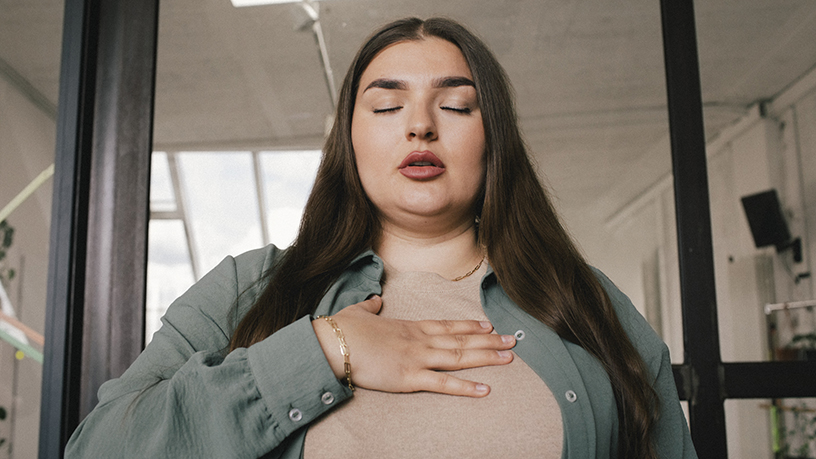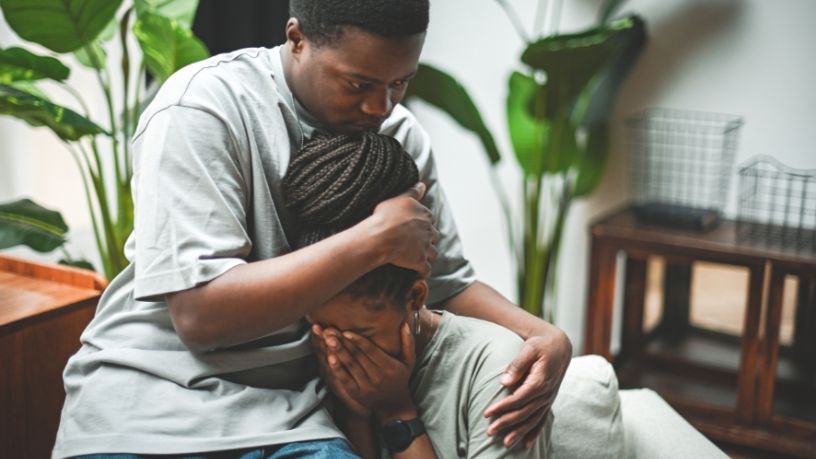On this page
Key takeaways
- Anxiety disorders are not the same as feeling anxious.
- If your anxiety interferes with your day-to-day life, it may be an anxiety condition.
- Most anxiety disorders can be treated with therapy, medication or both.
Anxiety is the most common mental health condition1 in Australia, with more than one in 6 or around 3.4 million people experiencing it2.
Everybody gets anxious when faced with a stressful situation. Mild anxiety can even be useful, particularly if you’re better at working under pressure. But when an anxious mood becomes excessive, long-lasting and interferes with your everyday activities, it’s time to seek help.
What is an anxiety disorder?
Anxiety disorder is a mental health condition that causes fear, dread and other symptoms generally considered to be out of proportion to the situation.
Anxiety-related conditions affect people of all ages and from all walks of life. The good news is that with the right treatment, it can be successfully managed.
What causes anxiety disorders?
What causes anxiety is not yet fully understood, but it does involve a complex interplay of genetic, environmental and psychological factors.
Anxiety can sometimes run in families. While some experts believe there may be a genetic component, many now suggest that anxiety may have a ‘learned’ element, so you might be more susceptible as a result of growing up among anxious people3.
Environmental factors that can cause anxiety include stressful, life-changing events such as bereavement, or witnessing or experiencing something traumatic. Illness, such as depression, alcohol dependence, chronic pain, heart failure, asthma or thyroid disease, can also trigger anxiety conditions.4
Taking illegal substances such as amphetamines and cocaine may cause anxiety. Stopping some medicines after taking them for a long time may have a similar result.
Always speak to your doctor before stopping medications.
Book online doctors
Access online doctors for simple medical health needs like requesting a prescription, asking for a medical certificate, or medical advice that may not need a physical consultation. Available to eligible Bupa members.
In an emergency, call 000.
What are the different types of anxiety disorder?
Phobias
Social anxiety disorder
Panic disorder
Obsessive–compulsive disorder
Post-traumatic stress disorder
Generalised anxiety disorder
Generalised Anxiety Disorder (GAD) is a condition that causes you to worry about everyday situations and issues. GAD is usually diagnosed when your worrying happens on most days, for at least six months. It is often a long-term disorder.
GAD might also cause fatigue, restlessness, muscle tension, grouchiness, and trouble sleeping. GAD often goes hand-in-hand with panic attacks and phobias.
What are the symptoms of anxiety disorders?
The key symptom of an anxiety disorder is feeling anxious and worried, along with the urge to avoid situations that trigger or worsen your anxiety. Anxiety disorders can manifest in extra psychological and physical symptoms that interfere with everyday life.
Psychological symptoms might include:
- sleeping difficulties (insomnia)
- feeling tired
- feeling restless or on edge
- being irritable or quick to get angry
- being unable to concentrate
- a fear that you're 'going mad'
- feeling out of control of your actions, or detached from your surroundings
Physical symptoms are caused by the body’s release of the hormone adrenaline.
These might include:
- dry mouth
- rapid heartbeat or palpitations
- tightness or pain in your chest
- shortness of breath
- dizziness
- needing to pee more often than usual
- difficulty swallowing
- shaking
- diarrhoea
How are anxiety conditions diagnosed?
If anxiety is affecting your daily life, talk to your doctor. They will want to identify what’s causing your anxiety, so they’ll ask about your symptoms, your family history, specific triggers and what medications you are taking.
Your doctor may refer you to a mental health professional such as a counsellor, psychologist or psychiatrist for a more comprehensive diagnosis and treatment plan. They may also refer you to a relevant specialist if they suspect a medical condition may be causing or contributing to your anxiety.
What is the treatment for anxiety disorders?
Most anxiety disorders are highly treatable with psychotherapy (talk therapy) and/or medicines, complemented by self-help support and advice. The aim is to help you break the cycle of anxiety and avoidance of its causes.
Treatment will depend on the type and severity of the anxiety disorder you have, and usually takes 4 to 6 weeks to take effect.
Self-help
Psychological therapies
Talking through your problems with a qualified mental health professional may help you better manage your anxiety. Cognitive behavioural therapy (CBT) is an effective therapy to help identify and address negative and unhelpful thoughts, feelings and behaviours. It can be accessed face-to-face or online.
Other therapies include behavioural therapy, mindfulness and problem-solving, relaxation and breathing techniques, and specifically for people with PTSD, a therapy called eye movement desensitisation and reprocessing (EMDR).
Medicines
Your doctor may prescribe medicines to help manage your anxiety condition.
- Antidepressants can be used on their own or in combination with other medications.
- Benzodiazepines may be prescribed if other treatments have failed to manage your anxiety sufficiently. These medicines are generally prescribed for short-term use.
- Beta-blockers may be prescribed to help reduce some of the physical symptoms of anxiety, such as rapid heartbeat or palpitations and shaking.
Always read the accompanying medicine information leaflet and contact your doctor or pharmacist if you have any questions.
Useful resources
If yours or someone else’s life is in danger, dial 000 immediately.
Lifeline Australia offers 24/7 crisis support online and on the phone at 13 11 14.
Beyond Blue offers 24/7 mental health information and support online and on the phone at 1300 224 636.
13YARN offers a national crisis support line for First Nations People on 13 92 76. The support line is available 24/7.
1800Respect is a 24/7 support service for people experiencing domestic violence. You can find support, counselling and information online or on the phone at 1800 737 732.
PANDA (Perinatal Anxiety & Depression Australia) supports the mental health of parents and families online and on the phone at 1300 726 306.
MensLine is a counselling service for men. You can get 24/7 support online and on the phone at 1300 78 99 78.
QLife offers LGBTQIA+ peer support online and over the phone on 1800 184 527.

At Bupa, trust is everything
Our health and wellbeing information is regularly reviewed and maintained by a team of healthcare experts, to ensure its relevancy and accuracy. Everyone's health journey is unique and health outcomes vary from person to person.
This content is not a replacement for personalised and specific medical, healthcare, or other professional advice. If you have concerns about your health, see your doctor or other health professional.
1Beyond Blue. (Last reviewed 2024). Anxiety.
2ABS. (2023). National Study of Mental Health and Wellbeing.
3Anxiety.com (2021). Anxiety Is Caused By Behaviour Not Genes
4National Institute of Mental Health. (2022). Anxiety disorders. U.S. Department of Health and Human Services.
5Meamar, M., RaiseAbdullahi, P., RashidyPour, A., & RaeisAbdollahi, E. (2024). Coffee and mental disorders: How caffeine affects anxiety and depression. In Progress in Brain Research (Vol. 288, pp. 115–132). Elsevier.
You might also like
Hack your anxiety: 5 science-backed ways to help find calm now
Getting help for anxiety is important. Here are some ways to help manage your anxiety at home.
What's the difference between anxiety and depression?
Anxiety and depression are common mental health conditions in Australia. Learn about the different signs and symptoms and where to get help.
A step-by-step guide to managing panic attacks
Panic attacks can happen at any time. Discover practical calming techniques and breathing exercises to manage a panic attack and ease your symptoms.
Taking care of your mental health: Who do you call?
Looking for mental health support? Read this guide to find out what services are available.





